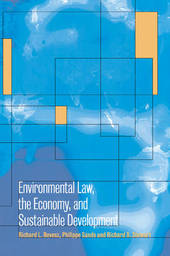
|
Environmental Law, the Economy and Sustainable Development: The United States, the European Union and the International Communit
Paperback / softback
Main Details
| Title |
Environmental Law, the Economy and Sustainable Development: The United States, the European Union and the International Communit
|
| Authors and Contributors |
Edited by Richard L. Revesz
|
|
Edited by Philippe Sands
|
|
Edited by Richard B. Stewart
|
| Physical Properties |
| Format:Paperback / softback | | Pages:448 | | Dimensions(mm): Height 229,Width 152 |
|
| ISBN/Barcode |
9780521049009
|
| Classifications | Dewey:344.046 |
|---|
| Audience | | Professional & Vocational | |
|---|
| Illustrations |
3 Tables, unspecified; 3 Line drawings, unspecified
|
|
Publishing Details |
| Publisher |
Cambridge University Press
|
| Imprint |
Cambridge University Press
|
| Publication Date |
7 January 2008 |
| Publication Country |
United Kingdom
|
Description
This book provides a comparative analysis of environmental regulation in multi-jurisdictional legal and political systems, focusing on the United States, the European Union, and the international community. Each of these systems must deal with environmental interdependencies that cross local borders. Some transjurisdictional environmental problems are global, including stratospheric ozone depletion, climate change and the loss of biodiversity. Other environmental problems, however, are localized in their effect on health and the environment: for example, municipal waste disposal, many forms of pollution and resource development, and drinking water quality. These varying jurisdictional and environmental circumstances pose the central question of how responsibility for addressing different environmental problems should be allocated among the different levels of decision making and implementation in a multi-jurisdictional system.
Reviews'The book is timely in considering the practice of risk assessment, which is already well established, if not without problems, in the US and is very much the coming trend in Europe ... Truly interesting and innovative ideas abound in this book, not least in relation to property rights, for example Chichilnisky proposes an International Bank for Environmental Settlements as a means of establishing and supervising a global greenhouse gas permit trading regime that takes into account not just straightforward economic considerations but also related and important issues of justice.' Journal of Environmental Law
|